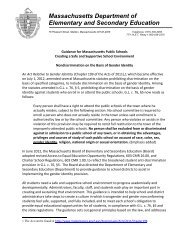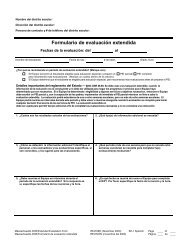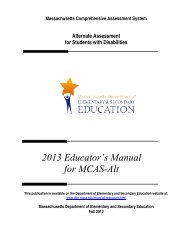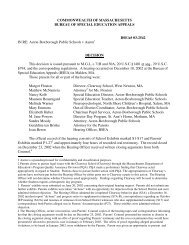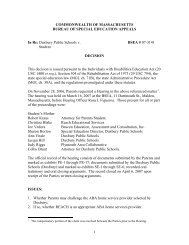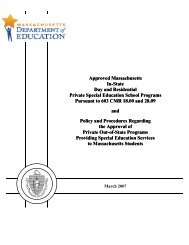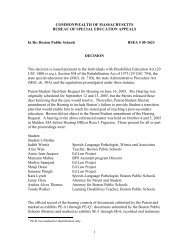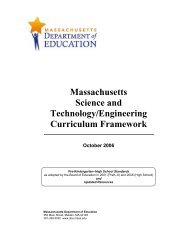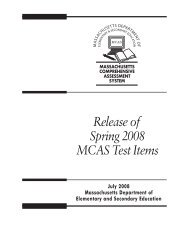Two Year Follow-up Review for Matthew J. Kuss Middle School
Two Year Follow-up Review for Matthew J. Kuss Middle School
Two Year Follow-up Review for Matthew J. Kuss Middle School
You also want an ePaper? Increase the reach of your titles
YUMPU automatically turns print PDFs into web optimized ePapers that Google loves.
<strong>Follow</strong>-<strong>up</strong> <strong>Review</strong> Report, Spring 03 <strong>Kuss</strong> <strong>Middle</strong> <strong>School</strong>, Fall River, MA page 16<br />
any would have occurred without the schedule adjustment. Clusters use one common planning<br />
session per week to meet with the Turning Points coach to set cluster goals, to review student<br />
work, to share strategies and to identify areas where curriculum topics, skills, and concepts can<br />
be integrated across content areas. A second common planning session per week is used to meet<br />
in content pairs with the grade level teacher of the same subject to coordinate adjustments in the<br />
curriculum scope and sequence as well as to share lesson ideas. A third session is often used <strong>for</strong><br />
parent meetings or to discuss individual student concerns. The common planning time during the<br />
day allows <strong>for</strong> small gro<strong>up</strong> professional growth opportunities within the required time limits of<br />
the teacher contract.<br />
While the common planning time <strong>for</strong> cluster teachers is credited with significant improvements<br />
in the professional climate at <strong>Kuss</strong>, there are concerns that the independence of each of the<br />
teaching clusters may impede overall school progress. Turning Points consultants worked with<br />
each cluster this year to develop cluster-specific goals and targets. Each team identified a general<br />
academic or behavioral target, and has used its cluster time together to develop strategies to<br />
address their individual goals. While admirable that teachers are directly involved in goal-setting<br />
and planning <strong>for</strong> improvement, the individual cluster goals do not appear to be closely linked to<br />
the overall school goals identified through the analysis of student academic achievement<br />
in<strong>for</strong>mation. Similar to concerns raised about insufficient monitoring of instruction school-wide,<br />
the clusters have few strategies <strong>for</strong> tracking what changes have been tried and whether they have<br />
had a positive impact on student achievement. Plans to maintain a cluster log of weekly meetings<br />
have not been sustained throughout the year, so anecdotal reports are the only record of<br />
improvement strategies pursued by each team.<br />
A second change that appears to the Team to have had an impact on <strong>Kuss</strong> teachers is the focused<br />
attention to specific school needs in the professional development offered to staff members.<br />
Differentiated instruction was the focus of a course offered by the University of Rhode Island in<br />
2001 attended by several <strong>Kuss</strong> faculty. This past fall (2002), the Massachusetts Teachers<br />
Association (MTA) offered an eighteen hour course on differentiation strategies. This was<br />
attended by a large number of <strong>Kuss</strong> faculty members. Differentiation of instruction was an area<br />
of weakness at <strong>Kuss</strong> identified in the Panel <strong>Review</strong> Reports and the 2001 Fact-Finding Report.<br />
To serve the school’s need <strong>for</strong> focused professional intervention, the District provides at least<br />
one early release day per month, along with the four full day opportunities throughout the year.<br />
Turning Points activities are conducted on these release days. It is likely that these extensive<br />
professional development opportunities have had an impact on teaching at <strong>Kuss</strong>, but there are no<br />
systems in place to monitor whether the strategies <strong>for</strong> improvement have been implemented or to<br />
determine the quality of implementation of many of the school’s curriculum modifications.<br />
Responsibility <strong>for</strong> overseeing curriculum implementation is delegated to the District Curriculum<br />
Directors and the Vice Principals. According to teacher reports, monthly meetings between<br />
content area teachers and their Curriculum Director are used to review pacing of the curriculum<br />
to consider adjustments or modifications to meet teacher and student needs. Teachers indicated<br />
they receive few visits during which their instruction is assessed, except <strong>for</strong> those visits required<br />
by contract. Only rarely did teachers report participating in peer review and observation, and the<br />
Vice Principal visits are generally cursory and irregular. The Vice Principals indicated that they<br />
Massachusetts Department of Education




